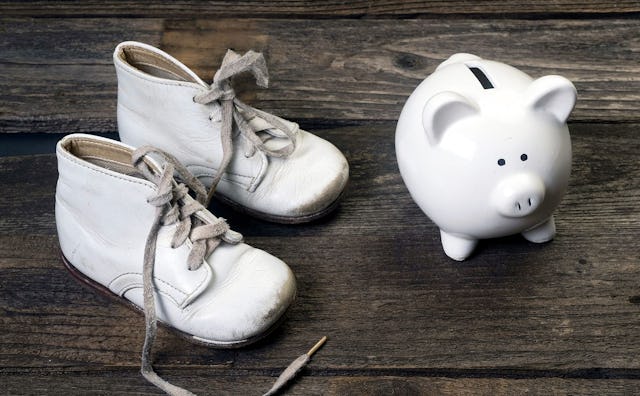8 Things Parents Of Recession Babies Want Their Kids To Know About Money

My husband and I graduated college during the boom years of the 1990s and absorbed two foolish (in hindsight) messages: that jobs would always be plentiful and that housing would always be a good investment. We had our first kid during the Great Recession and the second during the long, slow, painful recovery. We didn’t lose our home, but I was out of a job and our savings went poof faster than you can say subprime mortgage crisis. Raising two babies on shaky financial ground, while you watch everyone around you lose jobs and homes? It was a frightening and chastening experience. Like survivors of the Depression, I’ll forever be more cautious about money. And I want to teach my two boys what I’ve learned. Below, the eight lessons I’m going to hammer home.
1. You don’t need it. Whatever it is that you think you need, wait a month before you buy it. Every time I’ve gotten a bee in my bonnet for a new sofa or dress or computer, if I’ve waited a month, the urge has gone away. And usually been replaced by something else. Wanting things is just…how we are. I always want something. I’m trying to learn to just live with that feeling.
2. Just because someone wants to lend you money doesn’t mean you have to take it. If the bank says “Sure, you can afford a mortgage on your dream house,” but you’re subtracting the monthly payment from your paychecks and coming up with $4.23…yeah, trust your own math over the bank’s.
3. Layaway is a good idea. Want some big-ticket item? Put some money in an envelope every week. You’ll better appreciate what you buy, and you won’t make unconsidered purchases.
4. Your home is your home, no matter whether you own it or not. We used to think that we needed to own something to make it a home, which just isn’t true. Plenty of people have raised happy families in rentals.
5. And your home is not an investment. There’s no guarantee that your home will be worth more than you paid for it when you’re ready to sell. It’s a place to live, plain and simple, not a get-rich-quick, or even get-rich-slow, scheme.
6. When you are going to spend money, spend it on experiences and not stuff. Since money is finite, get the most bang for your buck: There’s an abundance of research that shows that people get more enduring happiness from having experiences, not from buying things. In other words, book the backpacking trip, don’t buy the latest gadget.
7. Live as cheaply as you can, especially when you’re young. Housing is supposed to take up one-third of your paycheck, no more, but in some cities it can go as high as half. Millennials, faced with a lousy job market, have made do with living at home or living with roommates—all of which is fine to do when you’re young.
8. Be flexible. Gen X was the last generation in which we defined ourselves by our jobs. Success for the younger generation is going to be defined by flexibility—the ability to keep redefining oneself as the job market constantly changes. We all know the rule about keeping up our skills as we get older, but I hope to teach my boys not only to do that but also to keep branching out in their skills, acquiring the knowledge and contacts to move from field to field.
Hopefully, our kids won’t remember living through the recession. And I also hope the economy for their first jobs will be rocking late-’90s style by then—a mother can dream, can’t she?
This article was originally published on